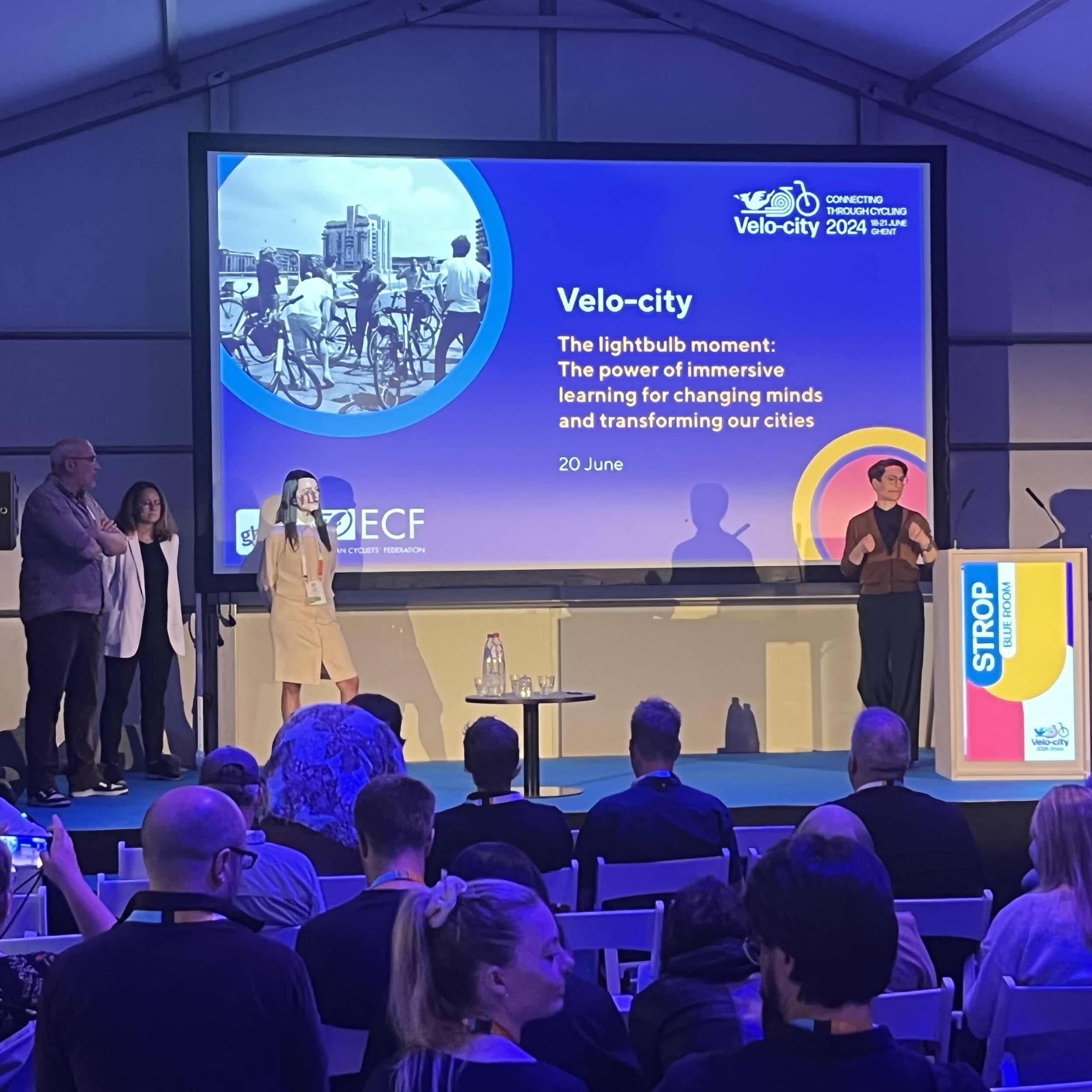Throwback to the Copenhagenize presentation at Velo-city Ghent
Velo-city 2024, held in Ghent, Belgium, was a 4-day long event packed with knowledge sharing and cycling experiences in a medium-sized city that’s mastered integrating cycling as a primary means of transportation.
Four members of the Copenhagenize team represented the company, sharing what we like to share most: knowledge. Kassandra and Clotilde, along with Meredith Glaser, CEO of the Urban Cycling Institute, and Jan Christiaens, CEO of Mobiel 21, conducted a master class on the power of immersive learning for changing minds and transforming our cities.
Here are the key ideas from the Copenhagenize master class.
For nearly a decade Copenhagenize has been offering master classes and organizing learning expeditions in the most inspiring bicycle-friendly cities. Through our educational projects, the team has had the chance to welcome thousands of people from all over the world. Here is our recipe for a successful learning expedition.
For each project we organize our objectives are to make people:
Forget about their old conceptions (that may be some mis-conceptions).
Dare to test new approaches or to adopt new behaviors.
Eager to learn how things work.
Desire to implement new things when they return home.
Our first ingredient is immersing our participants in the city and high-quality cycling infrastructure, since there is no better way to demonstrate its advantages. Experiencing something firsthand has a much greater impact than just reading or watching something about it online. Our goal is for participants to disconnect from their daily lives and work, allowing them to be fully immersed in the city and the topic of bicycle urbanism. Once in this state of mind, participants are more open to new ideas and knowledge. For this to work, we ensure participants feel comfortable and remove any stress associated with being in a new environment so they can focus on the experience. It’s a delicate balance to take people out of their comfort zones, while guaranteeing they appreciate what they are discovering.
The experience of physically going outside, especially when traveling, rather than half watching a webinar while working, enables participants to disconnect from daily lives and obligations and be more open to learning.
Our second ingredient is organizing bike tours and dedicating significant time to cycling during the learning expedition. What sounds normal to us is often pretty new for the participants. After creating a stress-free environment to ride, we start the tour without revealing the itinerary or the number of kilometers we will cover. Knowing the distance in advance might seem overwhelming. For instance, during our Master Class in Copenhagen last year, a participant tracked that he rode over 200 km during that week. Although this may sound intimidating beforehand, with top-notch services and infrastructure, participants realized that covering such distances is feasible in everyday life.
Our third ingredient is making every participant into a bike user and curious to learn how things work. During our learning expeditions in Flanders, which focus on bicycle and train intermodality, we demonstrate how this works by traveling exclusively this way throughout the trip. By going through the motions themselves participants see how strategically placed bike parking, bike rental services for commuters like Blue Bike, and ticketing and services at transit stops, make the experience hassle-free and attractive. Understanding how bike-train-bike travel works, enables participants to target how they could improve this type of transport when they return home.
What is the impact of this type of experience? This quote from one of our clients sums it up: “Thanks to this Learning Expedition, we saved six months on our project by gaining validation from our decision makers right after the trip.”
Experiencing best practices firsthand increases the likelihood of directly supporting high-quality implementation and bypassing the mediocre steps. Understanding from experiencing, the fluidity and ease of using great infrastructure and services means participants are more likely to return home and push for quality user-focused solutions.




